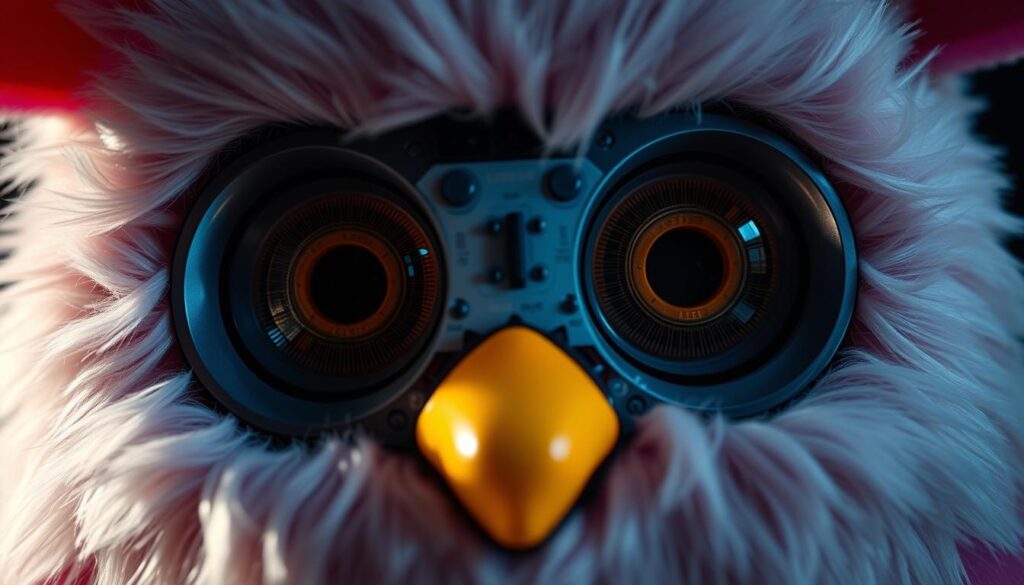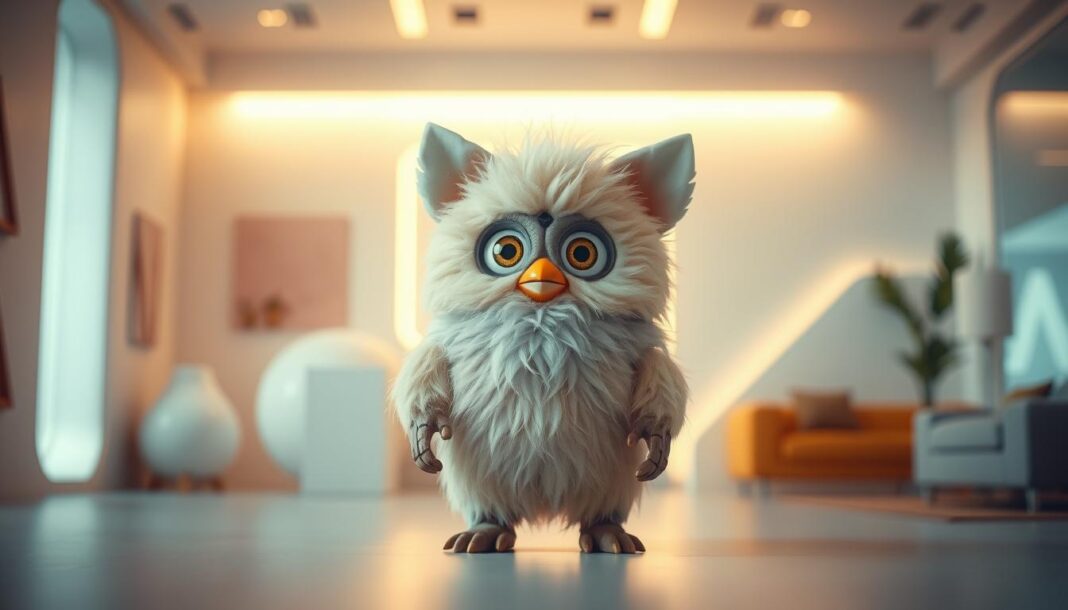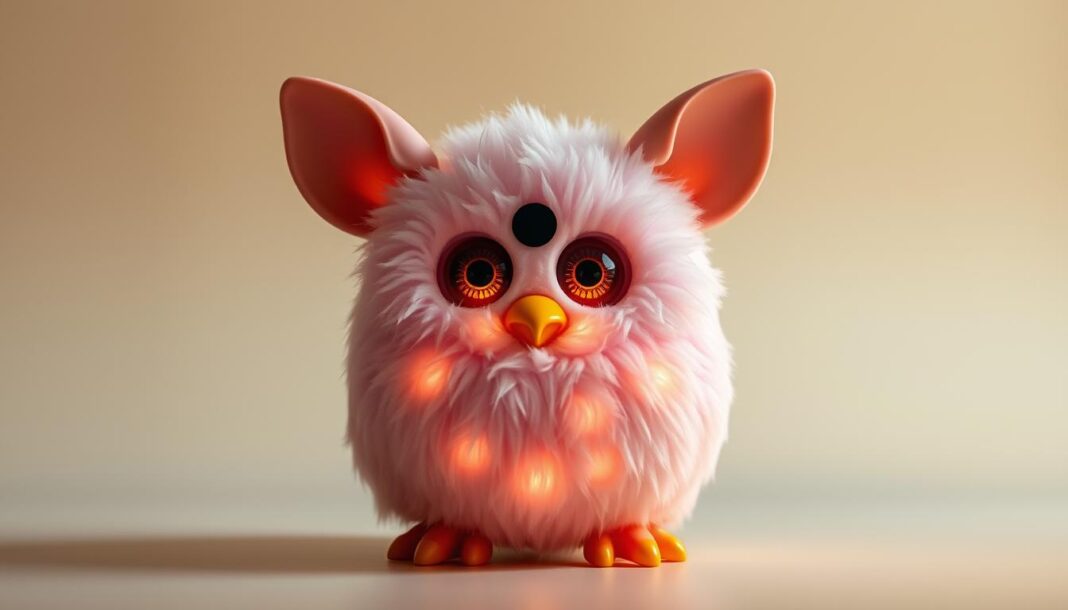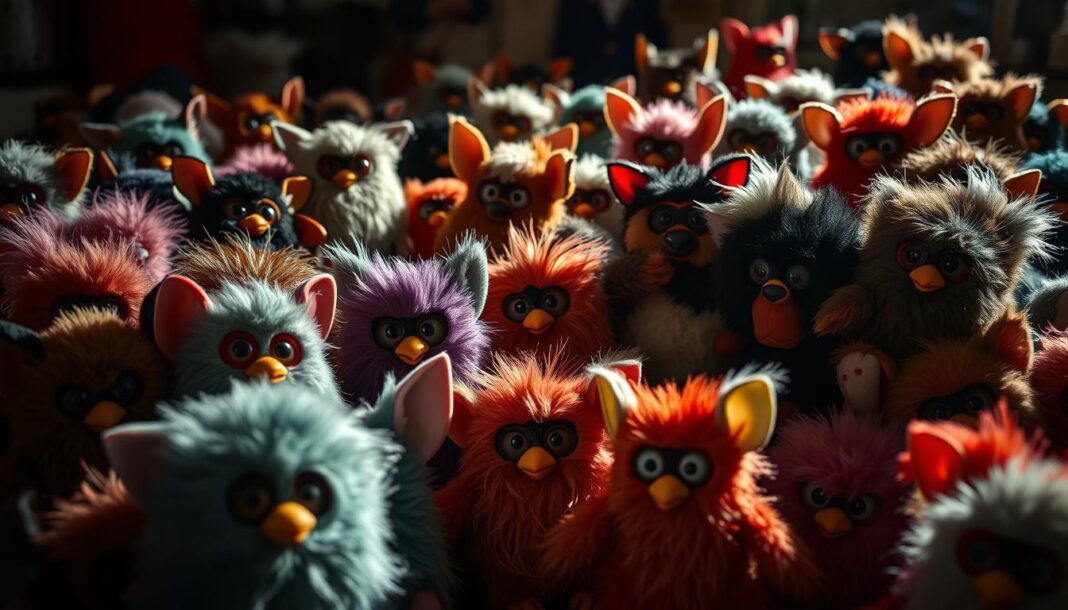Since its debut in 1998, the Furby has been more than just a toy—it’s a robot with personality. Designed to mimic learning and emotions, this interactive companion blurred the line between plaything and tech marvel. Its name became shorthand for innovation, blending mechanical charm with quirky behavior.
Over 40 million units sold worldwide, translated into 24 languages, prove its lasting appeal. From mechanical chirps to today’s app-connected updates, the furby meaning spans nostalgia and cutting-edge fun. This guide explores its journey, controversies, and why it still captivates the world.
What Is a Furby? Understanding the Furby Meaning
From its quirky sounds to evolving language, Furby has always been more than a toy. It’s a robot companion with a personality that grows over time, thanks to its unique speech system called Furbish.
The Creators Behind Furby: David Hampton and Caleb Chung
Inventors David Hampton and Caleb Chung designed Furby to mimic learning. Their goal? To create a friend that could bridge tech and play. The name “Furby” reflects its fuzzy exterior and playful spirit.
Furbish: The Unique Language of Furbies
Furbish blends English, Japanese, and Mandarin with fictional sounds. At first, it speaks only Furbish, like “doo-dah” (yes) or “u-nye-way-loh-nee-way” (sleep). Over time, it mixes in English, simulating language learning.
- Emotional Bonds: Phrases like “boo” (hungry) made owners feel needed.
- Cultural Phenomenon: Similar to Simlish in The Sims, Furbish became iconic.
- Global Updates: Later models added Russian, Polish, and Korean support.
This clever design turned Furby into a cultural touchstone, proving that even a toy’s language could spark connection.
The Fascinating History of Furby
The late 90s saw a robotic revolution with Furby’s unprecedented launch. This fuzzy companion didn’t just entertain—it learned, reacted, and even “spoke” through a mix of Furbish and English. Over five distinct generations, it evolved from clunky mechanics to app-powered smarts.
The Birth of Furby: 1998 Launch and Initial Success
Original models sold 1.8 million units in their first year. They featured infrared ports, 42 phrases, and supported 9 languages. Unlike other toys, Furby’s mechanical parts allowed it to blink, tilt, and “eat” via a plastic spoon.
Furby Revivals: 2005, 2012, and Beyond
Post-2000 revivals leaned into digital upgrades. The 2012 edition swapped gears for touch sensors, while 2016’s Furby Connect introduced color LCD eyes and joystick games. Not all updates thrived—the 2015 Star Wars Furbacca flopped due to poor marketing.
Different Generations and Models of Furbies
From limited editions like the gold-winged Furby Angel to the viral Furby Boom (2013), each model pushed boundaries. The Boom’s app let users hatch virtual Furblings—a quirky but beloved gimmick.
| Generation | Year | Key Features |
|---|---|---|
| Original | 1998 | Mechanical movements, 9 languages |
| Furby Babies | 1999 | 24 colors, faster English transition |
| Furby Boom | 2013 | App customization, Furblings |
| Furby Connect | 2016 | LCD eyes, joystick games |
| 2023 Edition | 2023 | Simplified design (no app, static eyes) |
For collectors, rare variants like the blue-eyed Shelby or Millennium Edition (only 500 made) are prized finds. Each iteration reflects tech trends—and sometimes, steps backward, like 2023’s stripped-down model.
The Cultural Impact of Furby
Few toys have captured global fascination like Furby did in the late 90s. Its blend of tech and charm turned it into a friend for kids and a curiosity for adults. Over time, its influence seeped into movies, music, and even internet lore.
Furby as a Must-Have Toy of the 90s
Holiday seasons saw stores selling out within hours. Its quirky personality and interactive design made it a status symbol. Parents camped outside toy stores, while kids traded tips on “training” their Furbies.
By 1999, it was a worldwide phenomenon, with knockoffs flooding markets. Limited editions, like the glittery Furby Baby, fueled collector frenzies. Even today, vintage models fetch high prices online.
Furby in Media and Popular Culture
Hollywood took notice. A live-action movie was announced in 2016 but scrapped due to studio issues. Lantern Entertainment later acquired the rights, leaving fans hopeful.
TV shows like The Big Bang Theory featured Furby as Sheldon’s sleep aid. Animated films, including The Mitchells vs. The Machines, parody its iconic look. Meanwhile, musicians like 100 gecs sampled its sounds in tracks like “Furby Island.”
Online, a subgenre of “Furby horror” thrives. Modified toys star in eerie YouTube videos, while games like Dreadbear reimagine them as villains. TikTok’s “long Furby” trend proves its lasting weirdness.
In 2023, the BBC celebrated its 25th anniversary, cementing Furby as a cultural touchstone. From toy aisles to viral memes, its legacy is undeniable.
The Technology Behind Furby
Behind every squeak and tilt, Furby hides decades of evolving robotics. This interactive robot combines fur-covered charm with sophisticated hardware, adapting to touch, sound, and even mood. From infrared ports to glow-in-the-dark ears, each upgrade reflects toy-tech milestones.

From Furbish to English: How Furby Learns
Early models used light and touch sensors to respond to play. The 2005 Emoto-Tronic edition simulated emotions—tilting its head when “sad” or dancing when “happy.” Voice recognition let it grasp basic commands in two languages, though later versions expanded to five.
The Evolution of Furby’s Interactive Features
By 2012, motion sensors and gyroscopes enabled spins and flips. The 2016 Connect model dazzled with color LCD eyes but frustrated users with mandatory app pairing. Today’s stripped-down 2023 version trades apps for pressure-sensitive ears—a nod to nostalgia.
| Year | Tech Leap | Key Feature |
|---|---|---|
| 1998 | IR Sensors | Basic light/motion responses |
| 2005 | Emoto-Tronic | Voice recognition, dancing |
| 2016 | LCD Eyes | Customizable animations |
| 2023 | Pressure Sensors | Glow-in-the-dark ears |
For the latest 2023 Furby updates, collectors praise its retro simplicity. Yet, the shift from app-driven smarts to tactile play divides fans. One thing’s clear: Furby’s tech keeps it relevant, even 25 years later.
Controversies and Security Concerns Surrounding Furby
Furby’s journey wasn’t without drama—security fears and cultural missteps shaped its legacy. While millions adored this interactive robot, governments and communities raised eyebrows over its design and global rollout.
The NSA Ban: Why Furby Was Considered a Security Risk
In 1999, the United States National Security Agency (NSA) banned Furby from sensitive facilities. Officials feared its microphone could record and later replay classified talks. A leaked memo wrongly labeled it an “audio recording device,” fueling NSA ban hysteria.
Though experts debunked the claims, the damage was done. Furby’s infrared ports—meant for toy-to-toy chats—were misinterpreted as spy tech. The ban became a quirky footnote in toy history.
Cultural Sensitivity and Naming Issues
Furby’s worldwide release stumbled over cultural clashes. The original name “Tay-Tah” was scrapped after complaints of *cultural appropriation*. Hasbro quietly updated it, mirroring Pokémon’s Jynx controversy.
In Sweden, the toy was renamed “Furbee” to avoid confusion with a place called Furby. Even the 2015 Star Wars collab, Furbacca, faced copyright heat for resembling Chewbacca too closely.
- Localization Challenges: The 24-languages rollout required careful phrasing to avoid unintended meanings.
- Inclusivity Updates: By 2023, Hasbro implemented stricter naming guidelines to respect global audiences.
These missteps showed how even playful tech must navigate cultural nuances—especially when targeting a world stage.
Furby Today: A Legacy That Endures
Decades after its debut, this iconic robot still captivates fans. The 2023 models, sold in coral, purple, and tie-dye, target millennials nostalgic for their childhood. Limited European releases and accessories like bead necklaces keep the popularity alive.
Inventor Caleb Chung recently reflected on its impact, calling it a “bridge between toys and AI.” DIY communities push boundaries with mods like Long Furbies or custom voice chips. Yet, critics highlight sustainability concerns over short tech lifecycles.
As AI companions evolve, Furby’s blend of charm and interactivity sets a benchmark. Its legacy? Proving even fuzzy robots can spark lasting connections.


